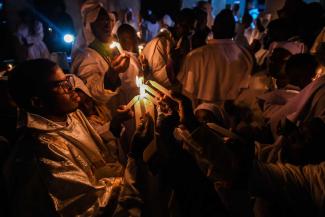Faith and mental health
How faith-based organisations are promoting mental health

Religiousness and faith can affect mental health and psychosocial wellbeing both positively and negatively. International humanitarian aid and development cooperation programmes have only started taking this potential into greater account in the past ten years or so, however. It’s surprising that it took so long – after all, over 80 % of the global population belongs to a religion.
“Religious communities and faith-based organisations are uniquely positioned to provide spiritual assistance to people affected by conflict and disaster,” reads the Charter for Faith-Based Humanitarian Action. It was endorsed in 2016 at the World Humanitarian Summit in Istanbul and represents a paradigm shift in the development cooperation of the Global North. Up into the 2000s, the dominant approach was secular: religion was considered a private affair, and development policy work should be neutral, rational and research based. There was a concern that faith-based actors would bring missionary or confessional interests into their collaborations.
Germany’s Federal Ministry for Economic Cooperation and Development (BMZ) also acknowledged in a 2016 paper that religion is an important source of values and provides orientation with regard to ethical and legal norms. According to the BMZ, it can increase the resiliency of individuals and whole societies because it offers explanations and rituals that help people deal with loss, sorrow, failure and catastrophes. Local religious actors have since started playing larger roles in programmes run by international aid organisations. Their local capacities and perspectives are being incorporated into programme planning.
The fact that many people place high value on spirituality and faith in their personal lives is just one dimension among many that has to be taken into account in a development context. Another important dimension is the importance of local religious communities and the role of religious leaders. Moreover, the institutional level also cannot be ignored, since churches and faith-based organisations can differ from secular organisations in ways that might influence the design of international development programmes.
Faith-based organisations are a diverse group of widely varying organisation types and religious affiliations. Christian organisations can range from internationally active church associations to civil-society organisations that are connected to a church through personnel or ideology to small, local church congregations in rural areas. They all present a variety of opportunities for international development cooperation, as the following examples will show.
The role of churches in regions with weak infrastructure
Some African countries have nowhere near enough state or private providers of mental health services. Religious institutions are often the first port of call for people seeking counselling, and they enjoy a great deal of trust. One example is the Nkhoma Mission Hospital near Lilongwe, the capital of Malawi. In a multi-year pilot project, the hospital is working with local churches to talk to the public about mental illness and the socially sensitive issue of suicide. The participants refer to religious spirituality and traditional values to destigmatise suicide and help people to stop seeing it as a spiritual deficiency.
Together with its long-term partner, the German Institute for Medical Mission (Difäm), the hospital is training pastors to pass along knowledge about mental illness and suicide to their congregations. The long-term goal is a fundamental change of perspective: in future, psychotherapy should be seen as a strength and those in need should be empowered to seek help.
Disappearing civic spaces
Numerous states are increasingly restricting civil-society work in order to silence critical voices. These vanishing spaces often remain open longer to churches and faith-based organisations than to many secular organisations. Examples of this phenomenon can be found in Europe, too, whether under the dictatorial regime in Belarus or in work with refugees in Greece, Hungary or Poland. Church groups are often initially exempt from legislation that raises taxes on organisations or requires costly registrations. If state funds run dry, churches and faith-based organisations can turn to church funds like collections in order to be able to work and express independent, critical views.
One example is criticism of Europe’s increasingly restrictive asylum policy. Churches and their organisations, like the Naomi Workshop for Refugees in Greece, the AIDRom umbrella association of churches in Romania or the Polish Ecumenical Council, have managed time and again to make themselves heard as progressive voices. Drawing on theology, they credibly call for countries to “welcome the stranger”. In doing so, they have repeatedly called attention to refugees’ poor mental health and the particular stress they are put under because of increasingly dangerous escape routes and their reception in destination countries.
Stabilising community life
Churches’ psychosocial work is not limited to the therapeutic care of a person by a mental health professional. Community and a structured, stable everyday life are also important. Affected people therefore also receive help finding a place to live, a functioning environment, neighbourly relationships or an economic livelihood.
There is a very great need for these kinds of supports in the context of the conflict in the Middle East, with its heavy losses, refugee movements and discrimination. The Young Men’s Christian Association (YMCA) in East Jerusalem aids disabled Palestinian youths with physical limitations by offering them a combination of therapeutic consultations and professional training. The YMCA’s services therefore combine hope for a better life with a sense of security.
Increasing pressure due to standardisation and efficiency requirements
In the global development context, churches and faith-based organisations have a great deal of potential from a spiritual and institutional perspective: they fill gaps when state or private service providers are lacking; they are very active on a variety of levels, in the treatment and prevention of psychological stress and mental illness; and they often have an important political voice. But their therapeutic and psychosocial work, like that of secular organisations, is coming under increased pressure. Standardised approaches and efficiency-oriented thinking do not work equally well everywhere. While the spiritual approach of these organisations can provide certain alternatives and freedoms, the funding requirements of international donors, performance indicators and the logic of effectiveness place technical limits on these freedoms.
We at Brot für die Welt, the Protestant development agency, offer guidance to project managers in our Berlin office to help them better understand project support in various regions: a 2024 handout should help them better recognise the psychosocial aspects of their work and thus deal with them more appropriately. The goal is to look at projects through the lens of trauma awareness: are people receiving help to optimally heal and overcome their trauma? Are we helping them feel safe and in control? Are we promoting empowerment and self-care? How can we take psychosocial dimensions into account in the project cycle, from the application to budget planning to project visits and evaluation? And how can the projects address potential power imbalances between those that provide help and those that receive it?
Answering these questions helps us support people with mental health concerns even better and promote mental health as an integral part of international programmes.
Sabine Schwirner works at Brot für die Welt and is a member of the psychosocial work and mental health section.
sabine.schwirner@brot-fuer-die-welt.de










